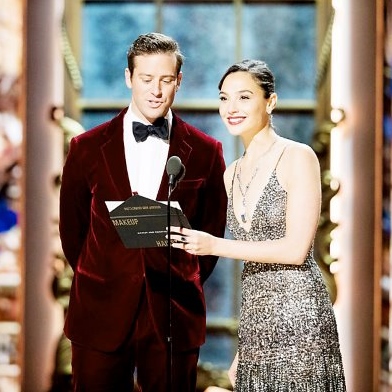
News

Oscars 2018: For Jewish nominees, a night not to remember
TOM TUGEND
So, when Hope served as host of the 1975 Oscar bash, he opened his monologue with “Welcome to the Academy Awards… or, as it’s known in my house, Passover.”
At Sunday’s 90th award ceremony, the notable Jewish nominees could largely repeat his punchline.
The list of Jewish nominees, all with realistic chances to strike gold, included two for lead actors Daniel Day-Lewis in Phantom Thread and Timothée Chalamet in Call Me by Your Name, both with Jewish mothers. Gary Oldman won for his portrayal of Winston Churchill in Darkest Hour.
Also nominated was repeat winner Hans Zimmer, who composed the score for Dunkirk, but who lost out to Alexandre Desplat for The Shape of Water, the eventual best picture winner.
Benj Pasek, who won the Oscar last year for best song for La La Land, failed to follow up in the same category for This Is Me from The Greatest Showman, although his song became the unofficial anthem of the 2018 Winter Olympics. The winner in the song category was “Remember Me” from the animated film, Coco.
The consolations for tribal rooters were few and far between. Call Me by Your Name, based on a 2007 novel by the Egypt-born Jewish novelist André Aciman, won for best adapted screenplay by James Ivory.
Director Barry Fogel won for best documentary for his feature Icarus, which helped expose Russia’s widespread athletic doping conspiracy. Fogel, a Denver native, previously developed, co-wrote and co-starred in Jewtopia, a successful play and later movie based on his book Jewtopia: The Chosen Guide for the Chosen People.
Two Jewish talents were notable for their absence from the proceedings.
Foremost was Steven Spielberg, arguably Hollywood’s most respected personality. The director of The Post, about journalists facing down the US government in the Vietnam era, was omitted from the list of five director nominees, although the film itself was nominated for best picture.
James Franco was expected as late as January to be a best actor nominee for his work in The Disaster Artist. Franco won the Golden Globe for the role, but between that triumph and the deadline for Oscar nominations, he was accused by five women of inappropriate or sexually exploitative behaviour. Although he denied the accusations, enough Oscar voters apparently decided to ignore his name.
Israel’s Gal Gadot, a box office sensation in Wonder Woman, presented the award for best make-up and hairstyling to the winner of Darkest Hour, and became the buzz of social media for the Art Deco-style necklace from Tiffany’s that she wore.
In the best foreign language film category, Israel’s entry Foxtrot had made the initial long list of nine nominees, but was eliminated when the list was whittled down to five.
The elimination of Foxtrot so annoyed Kenneth Turan, chief film critic for the Los Angeles Times that he wrote a column saying the judges “should be ashamed of themselves”.
It is somewhat risky to deduce a national trend from an evening of Hollywood awards, but the conclusions from watching them seem fairly clear.
Coming in the wake of the sexual harassment scandals that engulfed mega-producer Harvey Weinstein and other industry names, the presentations put the #MeToo and Time’s Up movements front and centre.
Host Jimmy Kimmel noted in his opening monologue that Weinstein, who was accused by more than 50 women of crimes ranging from rape to sexual harassment, was the first person to be kicked out of the Academy of Motion Picture Arts and Sciences since actor Carmine Caridi, who was expelled in 2004.
Throughout the night, the loudest voices – and applause – were for women’s job and pay equity, the achievements of immigrants, the box office might of the black superhero film Black Panther and the growing presence of Asian-Americans in film.
One Latino actor gave a brief nod to the historically outsize presence of Jews in the film industry. Oscar Isaac, who starred in the Star Wars sequel The Last Jedi, was asked on stage why he seemed to understand the bleeps of one of the film’s robot characters, BB-8.
“I speak Yiddish,” joked Isaac, who was born in Guatemala. (JTA)





GREG LANDMAN
March 12, 2018 at 3:16 pm
‘PLEASE NOTE SPIELBERG WAS THERE WEINSTEIN NOT’